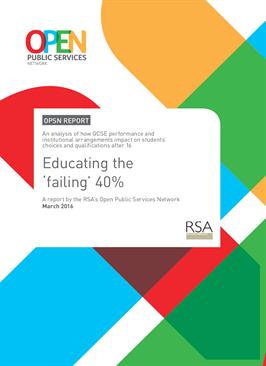This new RSA Open Public Services Network (OPSN) report takes a fresh look at post-16 education data at a regional and local authority level. By analysing the National Pupil Database, the RSA’s OPSN sought to understand how qualification entries and completion vary by institution and local area.
Key Findings:
-
Key Stage 5 options for students not achieving five A*-C grades at GCSE (OPSN bands one and two) vary considerably. Of children who fail maths and English at GCSE, in some parts of the country half will be entered for three Level 3 vocational qualifications. In other parts of the country up to 85 percent will not.
-
In most parts of the country, vocational education is provided only for those students who do poorly at GCSE, resulting in a notion of failure attached to studying vocational qualifications. However, there are a small number of exceptions in which excellent technical and vocational qualifications attract significant numbers of students with strong academic records (students within OPSN band five).
-
It is very hard to disentangle the degree to which institutional arrangements reflect population needs or determine what a population gets – but there are some clues. For example:
- We can see that students who do well at GCSE are less likely to do facilitating subjects (see glossary) at A level if they are in an area where they transfer to a sixth form college from school for post-16 education.
- Children with the same level of attainment at GCSE are less likely to continue to pursue academic qualifications if they attend an FE college as opposed to a school with a sixth form.
-
Portsmouth City Council is highlighted as a good example of a local authority that has been working with private businesses and partners in the city to increase the number of high-achieving students at age 16 taking up vocational qualifications at Key Stage 5.
This report is centred on valuing different educational pathways equally and offering students meaningful choice, based on talent and aptitude, not on assumptions of ‘better’ or ‘worse’ institutions or subject choices. Our recommendations seek to ensure that all students are provided with adequate choices and opportunities to succeed no matter what their previous attainment, where they were educated or where they live.
Download: "Educating the 'failing' 40 percent" (PDF, 2.6MB)
Read online: "Educating the 'failing' 40 percent" (on Medium)
Download the data
For our findings in this report, we analysed data from the National Pupil Database collected from students completing A levels in 2011/12, 2012/13 and 2013/14.
Complete this form to download the data:
Trouble seeing this form? View it online.
pdf 2.6 MB
Contributors





